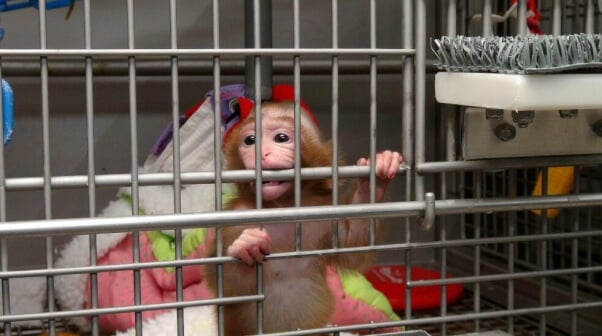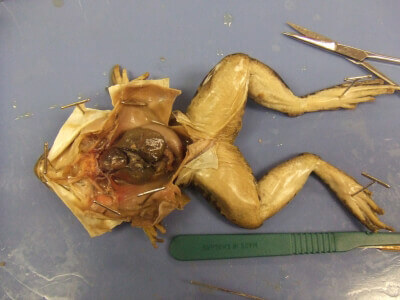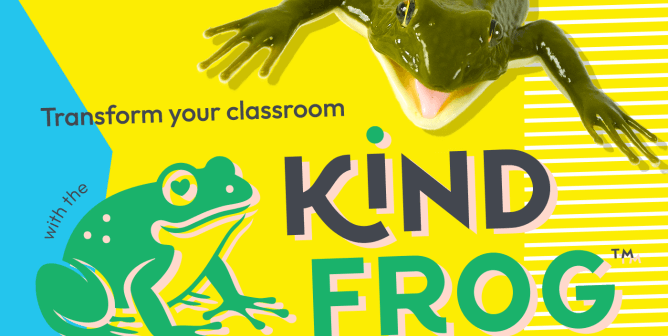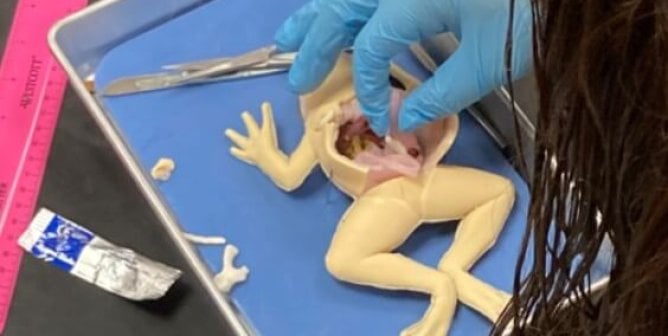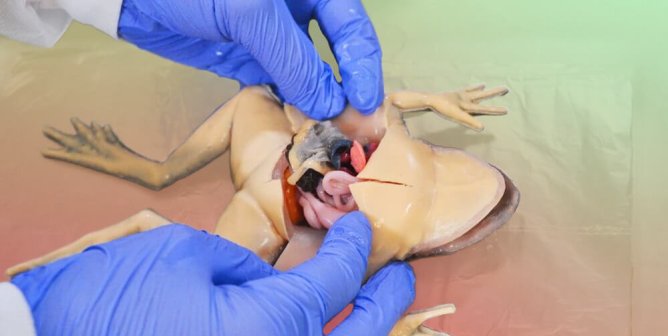Debate Kit: Should Animals Be Used in Experiments?
Are you interested in having a neuroscientist who is an expert in animal experimentation present to your class? Fill out the form at the bottom of our Request a Speaker page and we’ll be in touch about scheduling a virtual presentation to your class from Dr. Katherine Roe, the chief scientist of the Laboratory Investigations Department at PETA. Her presentations are favorites among teachers because of her vast knowledge in the field of animal experimentation. She’s available to present to all grade levels.
A hot topic in classrooms and on the minds of the public is the use of animals in experiments. Almost every classroom debate unit or school debate team’s topics include the question of whether or not it’s justifiable for humans to test on animals. Here at PETA, our core belief is that animals are not ours to use. We know that many schools assign debates on topical issues to help their students learn to speak and write persuasively, develop research skills, and recognize multiple sides of a controversial or multifaceted issue—and experimenting on animals is certainly one such topic. This student debate kit lists a variety of resources that can be shared with students to support the argument that animals shouldn’t be used in experiments.
Resolved: Animal testing is ineffective, unethical, and wasteful and should be replaced with non-animal methods.

Affirmative Argument
Millions of mice, rats, rabbits, primates, cats, dogs, and other animals are locked inside barren cages in laboratories across the country to be used in experiments. They languish in pain, suffer from extreme frustration, ache with loneliness, and long to be free. Instead, all they can do is sit and wait in fear for the next terrifying and painful procedure that will be performed on them. The lack of environmental enrichment and the stress of their living situation cause some animals to develop neurotic types of behavior, such as incessantly spinning in circles, rocking back and forth, pulling out their own fur, and even biting themselves. After enduring pain, loneliness, and terror, almost all of them are killed.
There are many non-animal research methods that can be used in place of animal testing. Not only are these non-animal tests more humane, they’re also more relevant to humans and have the potential to be cheaper and faster.
Each of us can help prevent animal suffering and take a stand against vivisection by buying cruelty-free products, requesting alternatives to animal dissection at school, donating only to charities that don’t experiment on animals, and demanding the immediate implementation of humane, effective non-animal tests by government agencies and corporations.
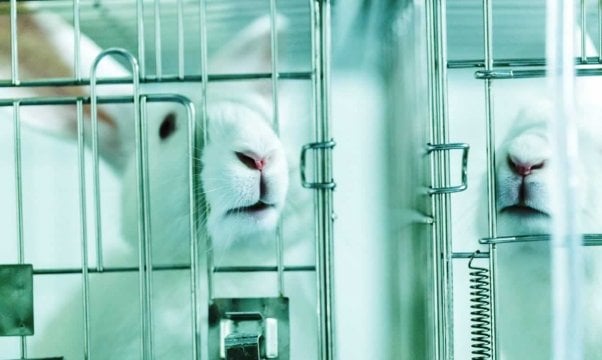
Become an ‘Expert’
Use the following links to conduct research on general information about vivisection and prepare logical arguments:
- 5 Horrific Animal Experiments Happening NOW
- Animals Used for Experimentation Factsheets
- Animals Used in Education
- Animal Testing 101
- Animal Testing Is Bad Science: Point/Counterpoint
- Does Animal Experimentation Save Human Lives?
- Experiments on Animals: Overview (PETA)
- Top Five Reasons to Stop Animal Testing
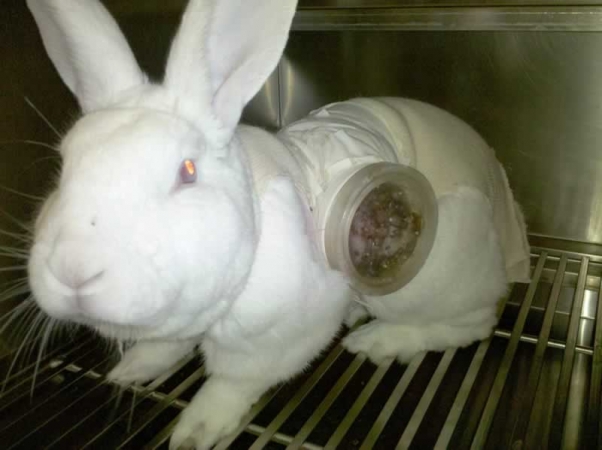
Build Your Case
Use the following links to gather evidence and examples to support your position against experiments on animals:
Research Articles, Scholarly Articles, and Investigative Analysis
- A Critical Look at Animal Experimentation
- Does Accreditation by the Association for Assessment and Accreditation of Laboratory Animal Care International (AAALAC) Ensure Greater Compliance With Animal Welfare Laws?
- The Flaws and Human Harms of Animal Experimentation
- Gallup Poll Shows Majority of Americans Are Concerned About Animal Rights
- Genomic Responses in Mouse Models Poorly Mimic Human Inflammatory Diseases
- More Americans Than Ever Oppose Medical Testing on Animals
- Poll Finds That Supermajority of Americans Oppose Tests on Animals
- Problems Associated With Animal Experimentation
Accounts and Statement From Vivisectors, Experts, and Patients
- 8 Expert Quotes Admitting That Testing on Animals Is Unreliable
- Dallas Doc Backs Protest of Texas A&M Dog Experiments
- Jane Goodall: Animal Experiments Are ‘Morally Wrong and Unacceptable’
- A Doctor’s View of Dissection
- Expert Statements: Texas A&M Muscular Dystrophy Experiments on Dogs
- Ex-Vivisector Wants Apes Out of Labs
- Forum: Scientists Need the Courage to Take a Look at Inhumane Experiments on Animals
- MD Patient Urges Charity to Stop Funding ‘Useless Procedures’ and ‘Failed Experiments’
- Statements of Scientific Consultants Regarding NIH Maternal Deprivation Experiments on Monkeys
- Yale Professor Says Experiments on Animals Are Wasteful
Eyewitness Investigations, Whistleblower Reports, and Videos
- Behind the Locked Doors of U.S. and French Dog Laboratories
- Dissection Must End: Pigeons Drowned, Live Crayfish Injected With Latex at Bio Corporation
- Dogs and Cats Suffer, Die at Liberty Research
- Eyewitness Exposé: Pain, Fear, and Death at Primate Products, Inc.
- Litany of Lab Horrors: A PETA Exposé
- PLRS: Undercover at a Product-Testing Laboratory
- Psychological Torture Experiments at NIH Must Stop
- The Silver Spring Monkeys: The Case That Launched PETA
- The University of Utah Must Stop Its Rogue Animal Experimenters
- Victory! UW-Madison Stops Cruel Experiments; Cats Saved
Evidence of the Wastefulness and Ineffectiveness of Vivisection
- Alzheimer’s Researchers Admit That Experiments on Animals Are a Big Fat Failure
- Animal Testing Is Bad Science: Point/Counterpoint
- Experiments on Animals Fail 90 Percent of the Time. Why Are They Still Done?
- Groundbreaking Study Shows Why Most Cancer Experiments on Mice Fail
- Mice Sewn Together in $300,000 Experiment That NIH Knows Is Bad Science
- Researchers: Experiments on Mice Don’t Help Humans
Finding the Solution
Use the following resources to help build a proposal suggesting solutions to issues that could allegedly arise if humans stopped experiments on animals:
- Alternatives Approved by Regulators
- Alternatives to Animal Testing
- Animal Testing Alternatives
- PETA Funds Non-Animal Methods
- Select Publications on Methods to Replace and Reduce Animal Use
Dissection-Specific Resources
- Cutting Out Dissection: Benefits of Non-Animal Teaching Methods
- Dissection
- Virtual Dissection Now: Alternatives
Anticipate Counterarguments, and Prepare Rebuttals
Analyze websites that support vivisection to determine their stated reasons for justifying the use of animals in experiments. Investigate what benefits laboratories, universities, and experimenters gain by using animals in experiments, and think critically about their motivations. Also, examine which other entities benefit from using animals in experiments (e.g., breeders, governmental organizations, and scientists who study only captive animals). Create a list of typical statements made by parties who want vivisection to continue. Information included in the links in this document can be used to respond to counterarguments.
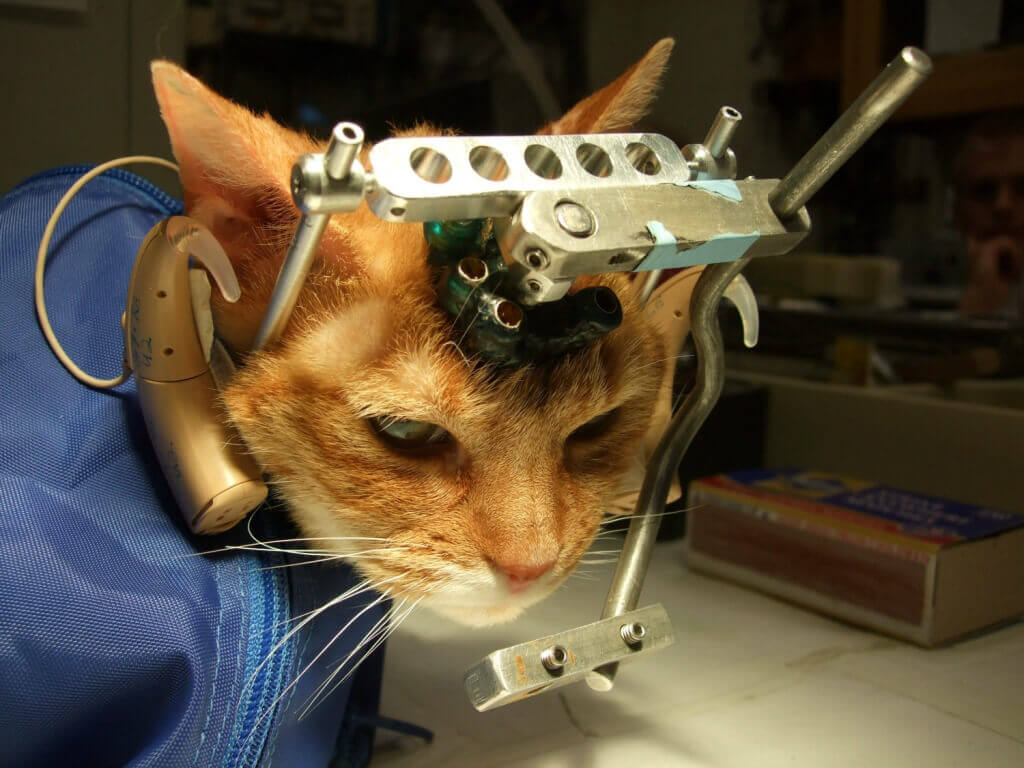
Additional Resources
Websites
- National Anti-Vivisection Society
- PETA International Science Consortium Ltd.
- PETA’s Eye on NIH Facebook Page
- Physicians Committee for Responsible Medicine
- Without Consent: PETA’s Virtual Exhibit
- Science Advancement & Outreach
Photographs
Books
- Animal Experimentation: The Consensus Changes by Gill Langley (Editor)
- Animal Liberation by Peter Singer
- Lethal Laws: Animal Testing, Human Health and Environmental Policy by Alix Fano
- Monkey Business: The Disturbing Case That Launched the Animal Rights Movement by Kathy Snow Guillermo
- MouseStruck by Ita Stein Gvirtzman
- Of Mice, Models, and Men: A Critical Evaluation of Animal Research by Andrew N. Rowan
- Sacred Cows and Golden Geese: The Human Cost of Experiments on Animals by
- Shaw on Vivisection by George Bernard Shaw
- The Cruel Deception by Dr. Robert Sharpe
- They All Had Eyes: Confessions of a Vivisectionist by Michael Slusher
- Victims of Science by Richard D. Ryder
- Voracious Science and Vulnerable Animals: A Primate Scientist’s Ethical Journey by John P. Gluck
- Rat Trap: The Capture of Medicine by Animal Research—and How to Break Free by Dr. Pandora Pound
*****
Have students use the curated content in this debate resource kit to prepare an affirmative argument stating why animals shouldn’t be used for experimentation. These resources will assist students in supporting their position using scientific, ethical, and philosophical arguments.
Want free educational posters and stickers for students to use during their debates? E-mail us at [email protected].
Do your students need to conduct an interview as part of their research? Staff members from PETA’s student sector are available to speak with students via phone, Skype, or e-mail and to answer questions about our stance on vivisection. Have students e-mail us directly at [email protected]—or if you’d like to contact us on their behalf, please fill out the form below, and we’ll arrange for them to speak with a representative.
By submitting this form, you’re acknowledging that you have read and agree to our privacy policy and agree to receive e-mails from us.

